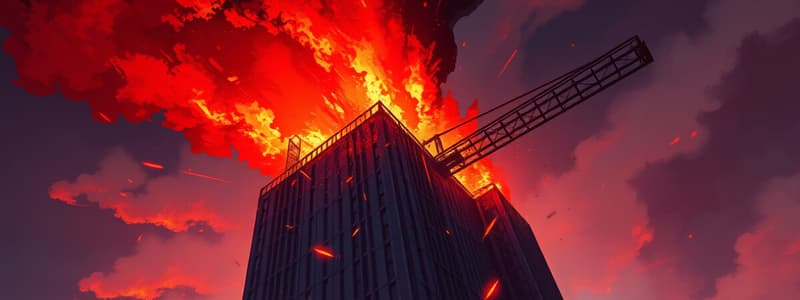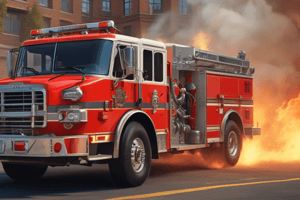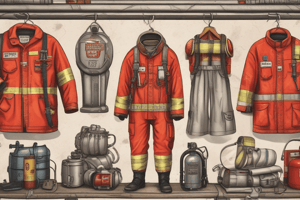Podcast
Questions and Answers
What is the approximate collapse zone required for a five-story building using the 12 ft per story estimate?
What is the approximate collapse zone required for a five-story building using the 12 ft per story estimate?
- 60 feet
- 90 feet (correct)
- 100 feet
- 75 feet
Which streams are beneficial for defensive firefighting operations?
Which streams are beneficial for defensive firefighting operations?
- Fog stream only
- Straight stream and fog stream
- Solid stream only
- All three types (straight stream, fog stream, and solid stream) (correct)
What is the primary rescue tactic employed in high-rise buildings?
What is the primary rescue tactic employed in high-rise buildings?
- Water supply management
- Well-placed offensive attack (correct)
- Evacuation
- Defensive attack
What does the air-tightness of a structure affect during a fire?
What does the air-tightness of a structure affect during a fire?
How is the ability to save lives and property primarily affected in firefighting?
How is the ability to save lives and property primarily affected in firefighting?
Which of the following does NOT constitute a residential occupancy?
Which of the following does NOT constitute a residential occupancy?
What is a preincident plan used for in firefighting contexts?
What is a preincident plan used for in firefighting contexts?
Which command staff position is NOT identified by NIMS?
Which command staff position is NOT identified by NIMS?
Study Notes
Structural Firefighting Key Points
- When structural integrity is at risk, firefighters should stay outside the collapse zone, which for a five-story building is approximately 90 feet based on a 12 ft per story estimate.
- For defensive operations, both straight and fog streams are useful; their effectiveness depends on specific circumstances.
- Water flows from sprinkler heads can reach up to 80 GPM, influenced by orifice size, type of head, and water pressure.
- Residential occupancies do not include limited care facilities which are exceptions in definitions.
- Air tightness affects vertical airflow and smoke behavior; the stack effect contributes to smoke movement in high-rise buildings.
- In high-rise emergencies, the primary rescue tactic is a well-placed offensive attack.
- The Homeland Security Presidential Directive establishes the National Incident Management System (NIMS) as mandatory for federal agencies during preparedness assistance.
- All command staff positions under NIMS report directly to the incident commander, including the safety officer, liaison officer, and public information officer.
- Response time is crucial for effective life and property saving measures.
- A preincident plan is necessary for properties with more than three buildings, detailing layouts and relationships between structures.
Studying That Suits You
Use AI to generate personalized quizzes and flashcards to suit your learning preferences.
Description
This quiz covers essential concepts in structural firefighting, focusing on safe operational practices, firefighting tactics, and the impact of building design on fire behavior. Participants will learn about effective tactics for high-rise emergencies and the importance of the National Incident Management System (NIMS) in firefighting operations.




